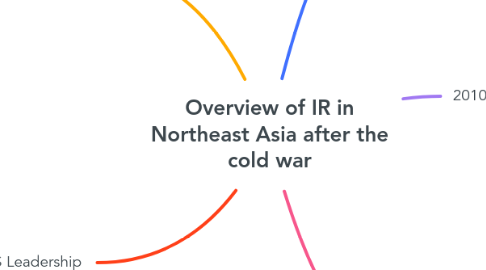
1. Various historical grievances
1.1. China accuses the industrialized states of irresponsible ravaging of our common heritage
1.2. China is also renewing its denunciation of the unjust world order that evolved in modern times
1.3. The debate over World War II is heating up
2. U.S Leadership
2.1. has rested on shared values as well as military power
2.1.1. Japanese and South Korean dependency on the US
2.1.2. Soviet Union faded and collapsed
2.1.3. colonialism and dictatorship rejected
2.2. the two detining twenteth-century events
2.2.1. the pro-longed struggles against Hitles's genocidal Nazi aggression
2.2.2. stalin's great terror communist machine
3. 1950
3.1. In China:
3.1.1. Fought its way to power -> prepared to rise up and modernize.
3.2. In Korea
3.2.1. The Korean War -> turned Koreans away from memories of the past.
3.3. In Japan
3.3.1. Preparations were under way for the San Francisco Peace Treaty.
4. 2010
4.1. Japan
4.1.1. Japanese revisionism: narrowly and missing the problem of Japan & US
4.2. Korea
4.2.1. South Korea’s rediscovery of history was overlooked
4.3. China
4.3.1. Sinocentrism + China influenced by old ways of thinking about its place in Asia => threatening the U.S. role
5. During the cold war
5.1. Korea
5.1.1. Normalization with Japan
5.1.2. The aroused grievances of the Korean people
5.2. China
5.2.1. History had little place
5.3. Japan
5.3.1. Japan relies on US leadership for economic development
